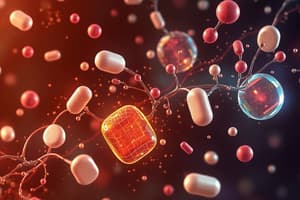Podcast
Questions and Answers
What adverse effect is associated with hydrochlorothiazide that requires monitoring for patient safety?
What adverse effect is associated with hydrochlorothiazide that requires monitoring for patient safety?
- Weight gain
- Hypertension
- Tachycardia
- Hypokalemia (correct)
Which of the following nursing implications is critical for patients taking diuretics?
Which of the following nursing implications is critical for patients taking diuretics?
- Monitor intake and output (correct)
- Administer in the evening
- Encourage high salt intake
- Limit fluid intake
Which adverse effect is specific to ACE inhibitors like captopril?
Which adverse effect is specific to ACE inhibitors like captopril?
- Cough (correct)
- Bradycardia
- Hypoglycemia
- Urinary retention
What distinguishes the mechanism of action of diuretics from that of ACE inhibitors?
What distinguishes the mechanism of action of diuretics from that of ACE inhibitors?
What is a primary concern regarding the use of potassium-rich foods in patients taking captopril?
What is a primary concern regarding the use of potassium-rich foods in patients taking captopril?
Which of the following is an important consideration for patients with a sulfa allergy when taking diuretics?
Which of the following is an important consideration for patients with a sulfa allergy when taking diuretics?
What is a critical side effect to inform a patient about when starting treatment with captopril?
What is a critical side effect to inform a patient about when starting treatment with captopril?
Why is orthostatic hypotension a significant concern for patients on hydrochlorothiazide?
Why is orthostatic hypotension a significant concern for patients on hydrochlorothiazide?
What effect does captopril primarily have on bradykinin?
What effect does captopril primarily have on bradykinin?
What is a significant contraindication for women of childbearing age with renal insufficiency related to medication management?
What is a significant contraindication for women of childbearing age with renal insufficiency related to medication management?
Which of the following is an adverse effect associated with ARBs?
Which of the following is an adverse effect associated with ARBs?
Which nursing implication is crucial when administering calcium channel blockers?
Which nursing implication is crucial when administering calcium channel blockers?
What should not be co-administered with ARBs?
What should not be co-administered with ARBs?
What mechanism of action do ARBs utilize?
What mechanism of action do ARBs utilize?
Which of the following adverse effects is associated with dihydropyridines like amlodipine?
Which of the following adverse effects is associated with dihydropyridines like amlodipine?
What is a contraindication for the use of ARBs in pregnant women?
What is a contraindication for the use of ARBs in pregnant women?
Which antihypertensive class primarily works by inhibiting the influx of calcium ions?
Which antihypertensive class primarily works by inhibiting the influx of calcium ions?
What is a potential consequence of taking an ACE inhibitor with an ARB?
What is a potential consequence of taking an ACE inhibitor with an ARB?
What is the primary advantage of using ARBs over ACE inhibitors?
What is the primary advantage of using ARBs over ACE inhibitors?
What is a significant adverse effect of beta-adrenergic blockers?
What is a significant adverse effect of beta-adrenergic blockers?
Which of the following is a potential nursing implication for using sodium nitroprusside?
Which of the following is a potential nursing implication for using sodium nitroprusside?
What effect do non-dihydropyridines like verapamil and diltiazem primarily have on cardiac function?
What effect do non-dihydropyridines like verapamil and diltiazem primarily have on cardiac function?
Which medication might increase the plasma concentration of certain drugs due to CYP3A4 interactions?
Which medication might increase the plasma concentration of certain drugs due to CYP3A4 interactions?
For which condition are beta-adrenergic blockers specifically not recommended as initial therapy?
For which condition are beta-adrenergic blockers specifically not recommended as initial therapy?
What effect do direct acting vasodilators primarily have?
What effect do direct acting vasodilators primarily have?
Patients on beta-adrenergic blockers should be monitored for which potential complication?
Patients on beta-adrenergic blockers should be monitored for which potential complication?
What is a key contraindication for using non-selective beta-blockers?
What is a key contraindication for using non-selective beta-blockers?
What symptom may indicate an overdose of beta-adrenergic blockers?
What symptom may indicate an overdose of beta-adrenergic blockers?
Which of the following is a recommended method to relieve edema in patients taking certain medications?
Which of the following is a recommended method to relieve edema in patients taking certain medications?
Flashcards are hidden until you start studying
Study Notes
Diuretics
- Prototype: Hydrochlorothiazide
- Mechanism of Action: Inhibits sodium/chloride channel in distal convoluted tubule, increases renal excretion of sodium and chloride, increases urine output, decreases blood volume, vasodilation
- Adverse Effects: Orthostatic hypotension, dizziness, hypokalemia, hyponatremia, hypercalcemia, hyperuricemia, hyperglycemia
- Nursing Implications: Advantages include low cost, reduced morbidity and mortality, and few side effects. Useful for patients with predisposition to kidney stones and osteopenia. Take in the morning or during the day to prevent sleep disturbances. Monitor input/output (I/O), weight, and laboratory values (labs). Advise patients to change positions slowly to avoid dizziness. Encourage potassium-rich foods and discourage salt substitutes. Avoid in patients with sulfa allergy or gout.
Angiotensin-Converting Enzyme (ACE) Inhibitors
- Prototype: Captopril
- Mechanism of Action: Blocks enzyme that converts angiotensin I to angiotensin II, inhibits breakdown of bradykinin (prolongs vasodilating effects)
- Adverse Effects: Cough, angioedema, pregnancy contraindicated, taste change, orthostatic hypotension, fatigue, rash, proteinuria, renal insufficiency, increased potassium, lower blood pressure (BP) and leukopenia
- Nursing Implications: Monitor labs and electrolytes. Consult the healthcare provider (HCP) if a cough becomes bothersome. Avoid salt substitutes containing potassium or foods rich in potassium. Black Box Warning (BBW): Do not get pregnant! Women of childbearing age should be on birth control. Avoid taking with angiotensin II receptor blockers (ARBs).
Angiotensin II Receptor Blockers (ARBs)
- Prototype: Losartan
- Mechanism of Action: Blocks angiotensin II at various receptor sites, prevents effects of vasoconstriction and aldosterone secretion
- Adverse Effects: Advantages include no cough and rare angioedema. BBW: Pregnancy
- Nursing Implications: Do not take with ACE inhibitors.
Calcium Channel Blockers
- Dihydropyridines:
- Prototype: Amlodipine
- Mechanism of Action: Inhibits influx of calcium ions in smooth muscles of blood vessels
- Adverse Effects: Cytochrome P450 (CYP3A4) metabolism, edema (peripheral or pulmonary), flushing, reflex tachycardia
- Nursing Implications: Educate patients on possible food and drug interactions. CYP3A4 inducers (e.g., St. John's wort) decrease effectiveness. CYP3A4 inhibitors (e.g., grapefruit juice) increase plasma concentration. Educate on relieving edema: compression socks, encourage walking, elevate the extremity.
- Non-Dihydropyridines:
- Prototype: Verapamil, Diltiazem
- Mechanism of Action: Inhibits influx of calcium ions in cardiac muscles and pacemaker cells
- Adverse Effects: CYP3A4 metabolism, bradycardia, arrhythmias (rare), heart block, heart failure (HF)
- Nursing Implications: Use with caution in patients with bradycardia, HF, and those taking beta blockers. More effect on heart function but less effect on vasodilation.
Beta-Adrenergic Blockers
- Prototype: Propranolol
- Mechanism of Action: Not initial therapy unless specifically indicated, blocks epinephrine and norepinephrine at beta-adrenergic receptors (decreases heart rate and contractility). Types: Selective (metoprolol, atenolol, esmolol) and Non-Selective (propranolol, timolol)
- Adverse Effects: BBW: Abrupt discontinuation can cause exacerbation of angina, dysrhythmias, and myocardial infarction (MI) in patients with coronary artery disease (CAD). Bradycardia and heart block. Exacerbates HF. Asthma and chronic obstructive pulmonary disease (COPD) use with caution. Tapering is essential. Masks symptoms of hypoglycemia (no tremors or tachycardia). Lowers blood pressure. Orthostatic hypotension. Circulation may be impaired. Signs and symptoms of overdose: Bradycardia, heart block, hypotension, and mental status change.
- Nursing Implications: Monitor heart rate and rhythm, weight, I/O, edema, and lung sounds. Do not stop abruptly. Avoid non-selective beta blockers in patients with asthma or COPD. Educate diabetic patients to check blood glucose (BG) regularly. Dangle and go slowly from sitting to standing. Caution in patients with peripheral vascular disease (PVD). Can cause erectile dysfunction (ED).
Direct Acting Vasodilator
- Prototype: Sodium Nitroprusside
- Mechanism of Action: Directly relaxes smooth muscle in blood vessels, resulting in dilation and decreased peripheral vascular resistance
- Adverse Effects: Nausea, agitation, muscle twitching
- Nursing Implications: Given intravenously (IV) and requires continuous blood pressure (BP) monitoring. Rapid onset and short duration of action. Converts to thiocyanate in the liver: Can cause cyanide toxicity (coma, dilated pupils, pink color). Monitor thiocyanate levels in labs. Antidote: Amyl nitrate inhalation.
Studying That Suits You
Use AI to generate personalized quizzes and flashcards to suit your learning preferences.




